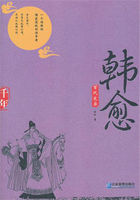SUCH were the six men who had sworn to destroy the world. Again and again Syme strove to pull together his common sense in their presence. Sometimes he saw for an instant that these notions were subjective, that he was only looking at ordinary men, one of whom was old, another nervous, another short-sighted. The sense of an unnatural symbolism always settled back on him again. Each figure seemed to be, somehow, on the borderland of things, just as their theory was on the borderland of thought. He knew that each one of these men stood at the extreme end, so to speak, of some wild road of reasoning. He could only fancy, as in some old-world fable, that if a man went westward to the end of the world he would find something--say a tree--that was more or less than a tree, a tree possessed by a spirit; and that if he went east to the end of the world he would find something else that was not wholly itself--a tower, perhaps, of which the very shape was wicked. So these figures seemed to stand up, violent and unaccountable, against an ultimate horizon, visions from the verge. The ends of the earth were closing in.
Talk had been going on steadily as he took in the scene; and not the least of the contrasts of that bewildering breakfast-table was the contrast between the easy and unobtrusive tone of talk and its terrible purport. They were deep in the discussion of an actual and immediate plot. The waiter downstairs had spoken quite correctly when he said that they were talking about bombs and kings. Only three days afterwards the Czar was to meet the President of the French Republic in Paris, and over their bacon and eggs upon their sunny balcony these beaming gentlemen had decided how both should die. Even the instrument was chosen; the black-bearded Marquis, it appeared, was to carry the bomb.
Ordinarily speaking, the proximity of this positive and objective crime would have sobered Syme, and cured him of all his merely mystical tremors. He would have thought of nothing but the need of saving at least two human bodies from being ripped in pieces with iron and roaring gas. But the truth was that by this time he had begun to feel a third kind of fear, more piercing and practical than either his moral revulsion or his social responsibility. Very simply, he had no fear to spare for the French President or the Czar; he had begun to fear for himself. Most of the talkers took little heed of him, debating now with their faces closer together, and almost uniformly grave, save when for an instant the smile of the Secretary ran aslant across his face as the jagged lightning runs aslant across the sky. But there was one persistent thing which first troubled Syme and at last terrified him. The President was always looking at him, steadily, and with a great and baffling interest. The enormous man was quite quiet, but his blue eyes stood out of his head. And they were always fixed on Syme.
Syme felt moved to spring up and leap over the balcony. When the President's eyes were on him he felt as if he were made of glass.
He had hardly the shred of a doubt that in some silent and extraordinary way Sunday had found out that he was a spy. He looked over the edge of the balcony, and saw a policeman, standing abstractedly just beneath, staring at the bright railings and the sunlit trees.
Then there fell upon him the great temptation that was to torment him for many days. In the presence of these powerful and repulsive men, who were the princes of anarchy, he had almost forgotten the frail and fanciful figure of the poet Gregory, the mere aesthete of anarchism. He even thought of him now with an old kindness, as if they had played together when children. But he remembered that he was still tied to Gregory by a great promise. He had promised never to do the very thing that he now felt himself almost in the act of doing. He had promised not to jump over that balcony and speak to that policeman. He took his cold hand off the cold stone balustrade. His soul swayed in a vertigo of moral indecision. He had only to snap the thread of a rash vow made to a villainous society, and all his life could be as open and sunny as the square beneath him. He had, on the other hand, only to keep his antiquated honour, and be delivered inch by inch into the power of this great enemy of mankind, whose very intellect was a torture-chamber.
Whenever he looked down into the square he saw the comfortable policeman, a pillar of common sense and common order. Whenever he looked back at the breakfast-table he saw the President still quietly studying him with big, unbearable eyes.
In all the torrent of his thought there were two thoughts that never crossed his mind. First, it never occurred to him to doubt that the President and his Council could crush him if he continued to stand alone. The place might be public, the project might seem impossible. But Sunday was not the man who would carry himself thus easily without having, somehow or somewhere, set open his iron trap. Either by anonymous poison or sudden street accident, by hypnotism or by fire from hell, Sunday could certainly strike him. If he defied the man he was probably dead, either struck stiff there in his chair or long afterwards as by an innocent ailment. If he called in the police promptly, arrested everyone, told all, and set against them the whole energy of England, he would probably escape; certainly not otherwise. They were a balconyful of gentlemen overlooking a bright and busy square; but he felt no more safe with them than if they had been a boatful of armed pirates overlooking an empty sea.
There was a second thought that never came to him. It never occurred to him to be spiritually won over to the enemy. Many moderns, inured to a weak worship of intellect and force, might have wavered in their allegiance under this oppression of a great personality. They might have called Sunday the super-man. If any such creature be conceivable, he looked, indeed, somewhat like it, with his earth-shaking abstraction, as of a stone statue walking.















